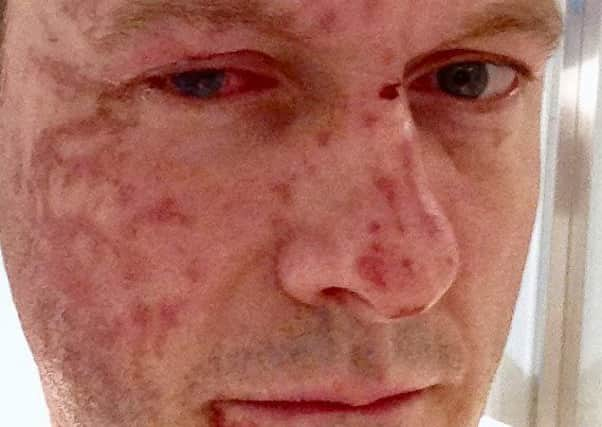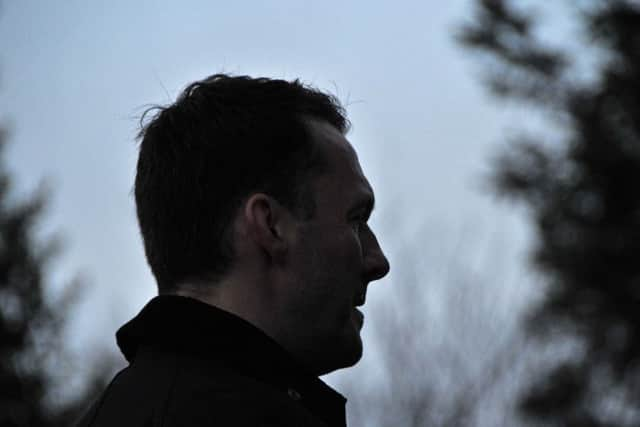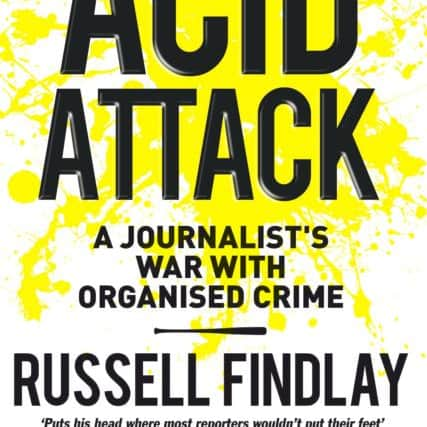Journalist reveals all about doorstep acid attack in new book


Two days before Christmas and the red blur of a postman’s jacket could be seen through the frosted glass of my front door. I eased it open slightly and his hand passed through a Royal Mail card and pen, with a mumbled instruction to sign for an unexpected special delivery. As I turned slightly to my left and looked down to scrawl my name, a shock of cold liquid splashed upwards across my face. From my mouth came a scream of terror. A glass bottle flew past my head. Mere milliseconds had passed but my brain calmly informed me that I was under attack – that some kind of toxic liquid had been thrown in my face and that my life was in danger.
The postman was fake. The card a distraction. His special delivery, I later learned, was a bottle of sulphuric acid. His task was to blind and maim – possibly even murder.
Advertisement
Hide AdAdvertisement
Hide AdThe empty bottle was instantly followed by the postman himself, who crashed into the hallway and lunged towards me. Fight or flight? repel him and retreat? or meet force with force? Truth is, there was no such choice. I had to get the postman out of my home, where I lived alone with my 10-year-old daughter, who was enjoying a long lie on the first day of the school holidays. With all my strength, I expelled him back into the cold morning air. We fell out through the door in an unorthodox embrace. We tripped, pirouetted and I landed on my back. A rib cracked as the postman’s bulk collapsed on top of me, forcing the air from my lungs.


My face was burning and the skin felt tight. The taste in my mouth was foul and bitter. My right eye – doused in acid – gave the ordinary suburban street a soft white filter, as if it were a dream. The postman scrambled to his feet and lumbered towards the road. ‘YOU’RE GOING NOWHERE,’ I bellowed, grabbing desperately at his jacket, which came away in my hands like a snake’s skin. He broke free, lurching towards his idling getaway car, but he was too slow and my fingers just managed to regain their grip. We both crashed back down hard onto the monoblock driveway, where we flailed violently. I was wrestling for control – he was fighting to flee. The tables turned. I was now on top of the postman. The getaway driver panicked and drove off, leaving him stranded. I straddled the expanse of his stomach and jabbed him with my fist, hard on the face.
Bang to rights
The phoney postman had been caught at the scene of the crime, in a fancy-dress costume, and the police
had numerous independent and credible witnesses.


The only thing that would make his prosecution more of a gift would have been for me to wrap him in Christmas paper, stick a bow on his head and leave him under the tree.
Difficult questions
William ‘Basil’ Burns stood handcuffed and silent in the familiar comfort of a court dock with his bowed head resembling a misshapen lump of raw steak mince. Much of his existence has been spent in prison cells due to an unfortunate and unshakeable habit of dealing drugs, waving guns around and, on at least one occasion, shooting people.
The court heard that Burns was charged with assaulting me by pretending to be a postman and throwing sulphuric acid in my face. As Burns slouched in the dock, his name came to me by text. It chimed but vaguely. He had never merited significant journalistic attention, largely due to his being off the radar through spells in prison. Brief proceedings over, Burns was carted off to jail, where he would awaken the next morning – Christmas Day – without so much as a selection box. Bail was not on the agenda because Burns had been out on licence when he attacked me, having been released early from a prison sentence for the shooting of an unarmed female security guard, who had only been trying to do her job. He fired a pistol at her from point-blank range during a Post Office robbery which netted him the princely sum of £15,500. Thankfully, his victim survived. For that, Lord Penrose sentenced Burns to 15 years in prison. Burns, however, had been granted early release by Parole Board Scotland, not once, but twice.


Once I learned of his identity, I hoped that it would become the first piece of a jigsaw which would eventually build a clear picture of the entire attack plot and everyone involved in it. But something was not right.
Scanning through old newspaper cuttings, I saw that Burns had spent a lifetime using guns on people. That was his comfort zone. Yet he came to my door wielding a bottle of acid. The intent of his paymaster was to destroy my face, to blind me, disfigure me, maim me for life.
Advertisement
Hide AdAdvertisement
Hide AdIt was clear that a great deal of effort had gone into planning the job – the establishment of my address, the certainty that I was home at the time, a trustworthy getaway driver, the creation of an exit strategy and the acquisition of Royal Mail accoutrements to pass unnoticed all point to a level of sophistication beyond that of a low-IQ thug.
When North Korean despot Kim Jong-un sent two women to assassinate his half-brother by wiping a nerve agent in his face at a Malaysian airport, they were described as ‘lizard’s tails’. Like a lizard losing its tail in a scrape, the arrest of Burns was no more than an inconvenience to his paymaster.


The person or people who wound him up, stuffed a fat wad of Christmas cash into his hand and sent him to my door were confident that his arrest posed no meaningful threat to them. When Burns sat down to be interviewed by the CID, his boss or bosses would have been confident that the only words to pass from his mouth would be: ‘No comment.’ Of that, they were proved entirely correct.
Winston Churchill once said: ‘You have enemies? Good. That means you’ve stood up for something, sometime in your life.’ Having poked and prodded Scotland’s major organised criminals for many years, I have no shortage of them. I did not go seeking them but, in my view, such people are worthwhile enemies to have. I’ve often said that life is not a popularity contest.
Trying to ascertain who had directed the attack was similar to working on any other news story, the unique and jarring difference being that I was the subject of my own enquiries. Burns was the lizard’s tail, but who was the lizard? Which gangland thug, or thugs, had been so riled by the truth being written about them that they would resort to an acid attack?
Trusted contacts got in touch to offer nuggets of intelligence, to be considered and cross-referenced with other information coming in from different sources. Journalists at the newspaper where I worked and friends on other papers were united in disgust. Newspaper journalists often have a quicker and clearer handle on gangland intelligence than the police. They made it their business to go fishing for answers. One excitedly trumpeted to his colleagues: ‘We need to find out who sent Basil Fawlty!’ Another added, rather unhelpfully: ‘Every gangster in Scotland would have chipped in to get you done in.’ No doubt, many of the killers, drug-dealers, paedophiles, money launderers, crooked lawyers and street thugs would have taken some pleasure from what had befallen me. But some criminals I had exposed were horrified, recognising that such a vile attack was unjustifiable.
Like a breakthrough moment in an enquiry, one phone call provided me with at least some of the answers. I was not in the least surprised at the name imparted to me, but one of the reasons offered to justify the attack was a bombshell. ‘He already hates you because of the stories you’ve done about him,’ the voice said. ‘But he’s now been telling people that you’re in a relationship with his ex.’
Acid Attack: A Journalist’s War with Organised Crime by Russell Findlay is published this month by Birlinn (£8.99, pbk) www.birlinn.co.uk